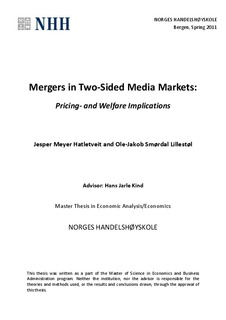Mergers in two-sided media markets : pricing- and welfare implications
Master thesis
Permanent lenke
http://hdl.handle.net/11250/168905Utgivelsesdato
2011Metadata
Vis full innførselSamlinger
- Master Thesis [4379]
Sammendrag
This paper discusses the pricing- and welfare implications of mergers in two-sided media markets. Media firms typically rely on revenues from two very different, but inextricably linked, customer groups: consumers and advertisers. As a result, the pricing decisions of media firms are more complex than those of firms operating in regular single-sided industries. We develop two theoretical models in order to investigate the effects of a merger between competing duopolists. In the first model, the only way for media firms to stimulate demand is by lowering content prices, whereas firms in the second model also can attract consumers by increasing the inherent quality of their product. As we abstract from the existence of efficiency gains, the merger should, in accordance with classic merger theory, inevitably be detrimental to prices and welfare. We find that content prices could decrease while welfare could increase as a result of a merger. Moreover, the merger could be welfare enhancing, even with higher content prices, if consumers are sufficiently compensated by virtue of higher quality products.
